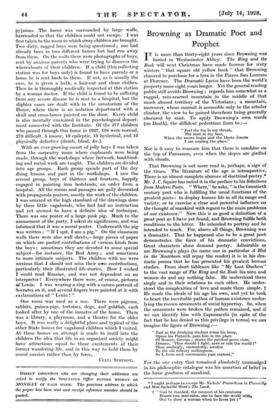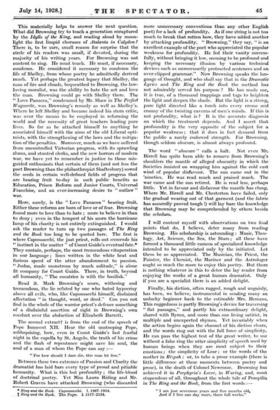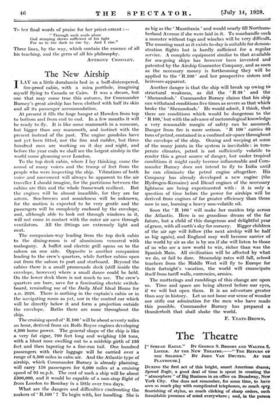Browning as Dramatic Poet and Prophet
IT is more than thirty-eight years since Browning was buried in Westminster Abbey. The Ring and the Book will next Christmas have made famous for sixty winters " that square old yellow book " that Browning chanced to purchase for a lyra in the Piazza San Lorenzo at Florence. The Dramatic Lyrics have been the world's property some eight years longer. Yet the general reading public still avoids Browning ; regards him somewhat as a rugged, rain-scarred mountain in the middle of that much abused territory of the Victorians ; a mountain, moreover, whose summit is accessible only to the scholar climber, the view to be gained therefrom being generally obscured by mist. To apply Browning's own words (on Death), the diffident pedestrian fears to :- " Feel the fog in my throat, The mist in my face,
When the snows begin and the blasts denote I am nearing the place."
Nor is it easy to reassure him that there is sunshine on the top of Parnassus, even when the slopes are girdled with clouds.
That Browning is not more read is, perhaps, a sign of the times. The literature of the age is introspective. There is an almost complete absence of doctrinal poetry.* Mr. J. C. Squire has noted it in the preface to his Selections from Modern Poets. " Where," he asks, " is the twentieth century poet who is fulfilling the usual functions of the greatest poets : to display human life in all its range and variety, or to exercise a clear and powerful influence on the thought of mankind with regard to the main problems of our existence." Now this is as good a definition of a. great poet as I have yet found, and Browning fulfils both conditions to the letter. He intended to portray and he intended to teach. For, above all things, Browning was a dramatist. That he happened also to be a great poet demonstrates the force of his dramatic convictions. Great characters alone demand poetry. Admirable as are Browning's plays (to name one in particular A Blot in the 'Scutcheon will repay the reader) it is in his dra- matic poems that he has presented his greatest human studies. From short tableaux like " My Last Duchess" to the vast range of The Ring and the Book his men and women do and say nothing false. He understood them singly and in their relations to each other. He under- stood the complexities of love and made them simple. t He made the ideals of his age his own, and yet he took to heart the inevitable pathos of human existence under- lying the rococo ornaments of social hypocrisy. So, when the ornaments were broken the pathos remained, and if we can identify him with Caponsacchi (in spite of the fact that he has denied us this privilege in terms) we can imagine the figure of Browning :— " Just as the drudging student trims his lamp, Opens his Plutarch, puts him in the place
Of Roman, Grecian ; draws the patched gown close, Dreams, ' Thus should I fight, save or rule tho world 1' Then smilingly, contentedly, awakes To the old solitary nothingness.
So I, from such communion pass content."
For the one entry that remained absolutely unsmudged in his philosophic catalogue was his assertion of belief in the basic goodness of mankind.
* I ought perhaps to except Mr. Nichols' Prometheus in Piccadilly and Miss Sackville West's The Land.
t " God be thanked, the meanest of his creatures Boasts two soul-sides, one to-face the world withi One to show a woman when he loves her 1" This materially helps to answer the next question. What did Browning try to teach, a generation enraptured by the idylls of the King, and reading aloud by moon- light the first limpid choruses of Atalanta in Calyckm ? There is, to be sure, small reason for surprise that the circle of his readers was small, if devoted, during the majority of his writing years. For Browning was not content to sing. He must teach. He must, if necessary, condemn. He considered it necessary to condemn the life of Shelley, from whose poetry he admittedly derived much. Yet perhaps the greatest legacy that Shelley, the man of fire and clouds, bequeathed to Browning, the law- loving moralist, was the ability to hate the act and love the man. Browning could go with Shelley there. The " Love Panacea," condemned by Mr. Shaw in The Perfect Wagnerite, was Browning's remedy as well as Shelley's. Where he left Shelley and became indeed his stern critic, was over the means to be employed in reforming the world and the necessity of great teachers leading pure lives. So far as he attached himself to anything he associated himself with the aims of the old Liberal opti- mists, with the strengthening of the laws and the mitiga- tion of the penalties. Moreover, much as we have suffered from uncontrolled Victorian progress, with its sprawling slums, and stunted clerks, and the new horrors of modern war, we have yet to remember in justice to those mis- guided enthusiasts that certain of them (and not less the poet Browning than the philanthropist Shaftesbury) sowed the seeds in certain well-defined fields of progress that are bearing fruit to-day in such public benefits as Education, Prison Reform and Junior Courts, Universal Franchise, and an ever-increasing desire to " outlaw " war.
Here, surely, is the " Love Panacea " bearing fruit. Either these reforms are born of love or of fear. Browning foUnd more to love than to hate ; more to believe in than to deny ; even in the tempest of his scorn the hurricane lamp of his charity is not entirely extinguished. I would ask the reader to turn up two passages of The Ring and the Book too long to be quoted here. The first is where Caponsacchi, the just priest, rolls out crescendo his " instinct in the matter " of Count Guido's eventual fate.* They contain, perhaps, the most tremendous vituperation in our language ; lines written in the white heat and furious speed of the utter abandonment to passion. " Judas, made monstrous by much solitude," is alone fit company for Count Guido. There, in truth, beyond all humanity, " The cocatrice is with the basilisk."
Read it. Mark Browning's scorn, withering and tremendous, the lie refuted by one who hated hypocrisy above all evils, who, like Caponsacchi himself, disdained affectation " in thought, word, or deed." Can you not find in the whole of the warrior priest's defence something of a disdainful assertion of right in Browning's own conduct over the abduction of Elizabeth Barrett.
The second extractt is from the end of the speech of Pope Innocent XIL Hear the old unstooping Pope, soliloquising, how,, even in Count Guido's last fearful night in the capella by St. Angelo, the truth of his crime and the flash of repentance might save his soul, the soul of a man of whom the Pope can say
For how should I dare die, this man let live."
Between these two extremes of Passion and Charity the dramatist has laid bare every type of proud and pitiable humanity. What is this but profundity ; the life-blood of doctrinal poetry. Yet Miss Laura Riding and Mr. Robert Graves have attacked Browning (who discarded
• Ring and the Book. Caponsacchi. 1. 1887-1954. Ring dnd the Book. The Pope. L 2117-2134.
more unnecessary conventions than any other English poet) for a lack of profundity. As if one string is not too much to break that rotten bow, they have added another by attacking profundity. " Browning," they say, " is an excellent example of the poet who appreciated the popular weakness for profundity. He fed their vanity success- fully, without bringing it low, seeming to be profound and keeping the necessary illusion by various technical devices such as unnecessarily protracted sentences and an over-clipped grammar." Now Browning speaks the lan- guage of thought, and who shall say that in the Dramatic Lyrics and The Ring and the Book the method has not admirably served his purpose ? He has made use, it is true, of a thousand trappings and tags to heighten the light and deepen the shade. But the light is a strong, pure light directed like a torch into every crease and cranny of the twisting caverns of men's minds. If this is not profundity, what is ? It is the accurate diagnosis on which the treatment depends. And I assert that profoundity is the very opposite of the subject for a popular weakness ; that it does in fact demand from the public a rarely endowed strength. For Browning, though seldom obscure, is almost always profound.
The word " obscure " calls a halt. Not even Mr. Birrell has quite been able to remove from Browning's shoulders the mantle of alleged obscurity in which the Societies insisted on wrapping him against the cold east wind of popular disfavour. The sun came out in the 'nineties. He was read much and praised much. The war came and the sun retired. He is read less, perhaps little. Yet in favour and disfavour the mantle has clung. Where Mr. Birrell and Mr. Chesterton have failed, only the gradual wearing out of that garment (and the fabric has assuredly proved tough !) will lay bare the knowledge that Browning may be comprehended by others beside the scholars.
I will content myself with observations on two final points that do, I believe, deter many from reading Browning. His scholarship is astounding : Music, Theo- logy, Art, Science, the Sea, the Stars ; all these have formed a thousand little cameos of specialized knowledge intended to be appreciated only by the initiated. Let them be so appreciated. The Musician, the Priest, the Painter, the Chemist, the Mariner and the Astrologer ought so much the more to enjoy this poetry. But there is nothing whatever in this to deter the lay reader from enjoying the works of a great human dramatist. Only if you are a specialist there is an added delight.
Finally, his diction, often rugged, rough and ungainly, has been, we believe, instrumental in sending many an unlucky beginner back to the estimable Mrs. Hemans. This ruggedness is partly Browning's device for traversing " flat passages," and partly his extraordinary delight, shared with Byron, and more than one living satirist, in multiple and unexpected rhymes. Yet invariably when the action begins again the channel of his diction clears, and the words ring out with the full force of simplicity. He can pass the highest test of the great writer, to use without a false ring the utter simplicity of speech used by human beings when they are most subject to their emotions ; the simplicity of Lear ; or the words of the mother in Rizpah ; or, to take a prose example (there is little difference at these moments between poetry and prose), in the death of Colonel Newsome. Browning has achieved it in Porphyria's Lover, in Waring, and, most stupendous of all, throughout the whole tale of Pompilia in The Ring and the Book, from the first words :- " I am just seventeen years and five months old. And if I live one day more, three full weeks." To her final words of praise for her priest-errant :- "Through such souls alone God stooping shows sufficient of his light
For us in the dark to rise by. And I rise."
Three lines, by the way, which contain the essence of all his teaching, and the germ of all his philosophy.
ANTHONY CROSSLEY.






































 Previous page
Previous page